Game Security
How to Deal Blackjack: Part 10
Table of Contents
How to Deal BlackjackFurther Reading
- Part 1: How to Deal Blackjack: A Step-by-Step Dealer Guide
- Part 2: How to Shuffle Blackjack Cards (Dealer Techniques and Procedures in 2025)
- Part 3: How to Cut, Wash, and Burn Cards in Blackjack (Dealer Procedures in 2025)
- Part 4: Delivering Cards, Pitching, Tucking Hole Cards, Checking Ace & 10
- Part 5: Handling Cheques, Playing the Game
- Part 6: Take & Pay Procedure
- Part 7: Player’s Actions & Blackjack
- Part 8: Color Up, Dead Game, & Other Procedures
- Part 9: Dealer’s Break, Tokes, Customer Service & Other Policies
- Part 10: Game Security
Did this free course help you?
Click to leave a tip to help keep this resource free!
Game Security
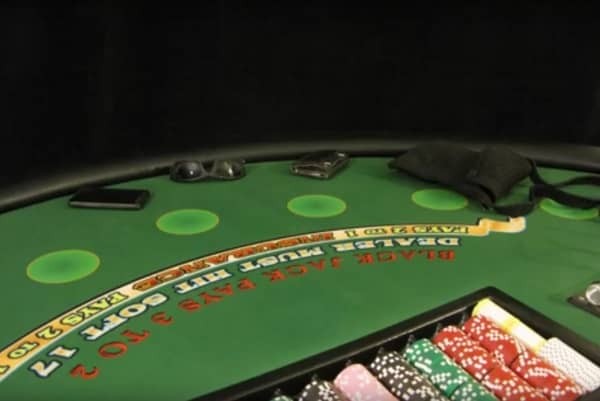
There are a couple extra steps you can take to strengthen your game security. Always case the layout. Check to see that there are any purses, wallets, glasses or anything on the layout.
Keep your eye on the table at all times and know the betting patterns of your players. Make sure there are no confusing bets, bets over or under the table limit or situations that need to be taken care of before the cards come out. Never assume you understand what the player wants, always get a definite answer. One of the best ways to case the layout is by walking the game. This allows the dealer to watch the table at all times. Keep your body square to the table and spread your feet in a wide stance. When you deal to the right side of the table then lean to your right and turn your body slightly so you can see the entire table. Do the same for the other side. Never turn your back on the bankroll, even if you have a dead game. The rack must always be in your vision.
Cheating
People cheat all of the time and in creative ways; that is why you must watch the table at all times. If you see something out of the ordinary then discretely notify your floor as soon as you’re able. The following are questions to ask yourself or things to look for that indicates a player is cheating. Is the player constantly looking to see where the floorman is at? Is the player regularly reaching for his pants or shirt pockets? Is the player completely covering his cards with his hands? He could be switching the cards and marking or altering them in some way. This way, they can tell what card is coming out next or what the dealer’s hole card is. Look for cards that are crimped, folded, cut, nicked, bent, ink marked, and sanded.
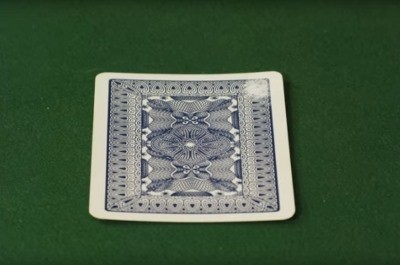
There is a spot on the back of the card where a player can rub it until it is a small white “mark”.
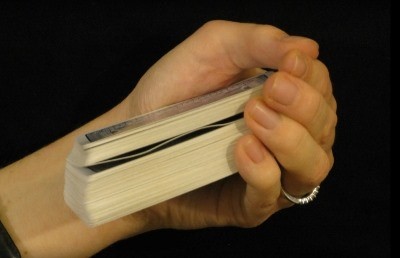
And the player can bend the card so it has a wave to the edge. You can see this when you look at the side of the deck.
Does the player frequently stare at the deck while you’re shuffling? He might be getting a peek of the cards that are being flashed and he might be able to read the deck that is being shuffled. Is the player playing two hands and continuously looking at both hands back and forth? They might be trying to switch their cards. Stop them right away and tell them they can only touch one hand at a time, this makes switching the cards harder to execute. Is 1st or 3rd base providing a planned distraction? Did they start an argument, spill a drink, or ask a personal or rude question? Be aware of unusual occurrences that are distracting, the player on the other side might be trying to switch cards or cheques around. Are the people standing near the table continuously watching the deck? People who insist on standing near the table but don’t want to play might be watching the cards and signaling to someone who is playing. Is the player making any unusual hitting or standing decisions? Did the player suddenly increase his bet by a large amount? Dealers look for certain things to catch card counters; like not following the book or betting sporadically. Card counting is not illegal, the casinos just frown on it and the most they will do is throw the player out.
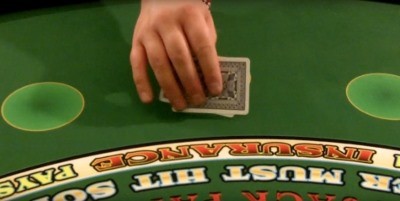
Is the player covering their bet or blocking their bet from view?
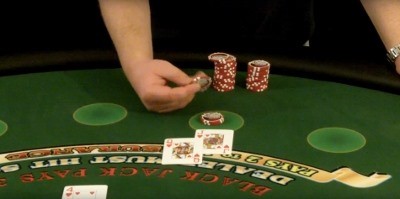
Have any of the bets changed during the hand? Is the player handling his cheques near or above their bet?
Is the players hand near or over the bet? They could be adding or subtracting from their bet. When the player takes money off his bet this is called Pinching and when he adds money to his bet this is called Pressing or Capping the Bet. These players will usually choose 1st or 3rd base, since those are the hardest spots to watch. Some ways to prevent this is to take a quick glance at all the bets and commit it to memory; listen for the sound of clapping cheques, because if you’re in the middle of the hand you shouldn’t hear that sound, and don’t allow the player’s hand anywhere near the betting circle after the hand has started. Is there anyone near or on the table that is talking on their phone? They could be talking to a person who saw the dealer’s hole card or they could be using an application to count cards. If you see anyone with a cell phone politely tell them to put it away. If there are any problems then call over the floor.
Situations
Dealing
When you’re on a dead game you will get bored and probably start talking to the dealer on the next table. Its human nature and it’s called cross-firing. Never do this, especially if there are players on either table because you can get written up for it. If a player doubles down or splits before the dealer flips a blackjack. What do you do? After you flip the blackjack, push back the 2nd bet and take the original bet only. When you’re dealing on a handheld game and the card you just pitched flies off the table, stop dealing, call Card Down and keep an eye on the area where the card is. The floor will come over and pick up the card and check to make sure that there is no damage or any marks on it before giving it back. Train yourself to watch the players bankroll and the way they are playing. It’s your job to make sure that their bankroll never runs out of cheques or dollars for your tip.
Customers
There will be plenty of times when you’ll get into an argument with a player. It happens to every dealer. If you yell back or you’re rude you could get fired. So instead call over the floor immediately, tell him what happened and then stay polite and quiet. Player’s will always ask dealers for advice on how to play a hand. There is a thin line between giving a player advice and playing their hand for them, which you are not allowed to do. When a player asks for your advice you’re supposed to quote the book. “The book says to stay”. By saying this, the dealer, hence the casino, is not taking responsibility when the player loses. Sometimes you’ll have a player on your table that only plays a hand every once in a while. The casino doesn’t mind this unless the table is full and there is another player wanting to come in that is willing to play every hand. Give the seat to the player that wants to play every hand, unless the original player decides to start betting continuously.
When a player spills a drink on the table, it’s the dealer’s responsibility to clean it up. There should be a towel hanging from the underside of the table, if not the floormen can bring you one. Never cover up the cheques with the towel. And try to save the cards first and foremost. If the cards are marked by the liquid then the floormen has to be called. Never knowingly put marked cards in the discard rack. During all this, you still have to watch the entire table, so don’t get tunnel vision when cleaning up; angle your body so that you can clean up the spill while still watching the table.
Sometimes a player will put his bet in the betting circle after the hand has already started. Immediately say “No Bet” while pushing their cheques back to them. No bets can be altered once the first card has come out. Occasionally a player loses their stack of lucky cheques and begs you to trade them. Tell them “No” because players can’t switch one currency for another. Never take any currency or cheques directly from the player’s hand. Always ask the player to set the money on the table first and then pick it up. Casino management is allowed to change the table minimum and maximum at any time. Management may also allow a player to play below or above the limit.
Real Life Experiences
Normally, when a person wants to become a dealer, they find a dealing school with connections to a casino. When you start, you only need to learn one of two games, blackjack or craps. Craps dealers will usually only deal craps and men tend to get hired more for this game. Blackjack dealers are also called table game dealers because they will often deal more than one game. Women tend to get hired more for these games. After you’ve trained for a while, the school will get you an audition to a break-in house. If the school doesn’t have connections, then you need to apply to the break-in houses yourself. You don’t need a certification or any document saying you passed your courses, all you need to do is go to the casino and pass the audition to get the job. Some break-in houses include the downtown casinos or the Gold Coast.
If you don’t live in Las Vegas, Reno, or Atlantic City then consider the casinos around you as break in houses. This means that they will hire people with little to no experience and train them while they are at work. If you’re lucky they will call you for an audition. At the audition, they will put you on a game that’s on the casino floor with players on it, and you will be expected to deal as if you were already hired.
When auditioning, you’ll want to have a good appearance. Your hair must be clean, neat, and groomed. Usually beards and mustaches are not allowed. Women are not allowed to wear braids. Fingernails must be neat and clean. Wear nice black pants, no jeans, and a long sleeve white button shirt and black shoes. This is called your “Black & Whites” or “Salt & Peppers”. You will wear these at your audition. At your audition you’ll deal on a live game as the casino managers observe your basic skills.
Make sure to smile, be happy and pleasant. Don’t worry if you make a mistake, they’ll understand you’re nervous. During the audition the shift manager will watch your shuffling, making change, cutting cheques, the way you deliver the cards, game protection, to see if you can count, game procedure, personality and human relations.
If the casino wants to hire you expect a credit check, background check, a drug test, fingerprinting, and a possible Facebook check. Plus you need to get and regularly update a gaming license. Management knows you’re going to be bad at first. This is expected. They will train you the way they want you to deal. You will either be given a shift or management will ask you what shift you want. Day Shift is usually from 12pm – 8pm. Swing Shift is usually from 8pm – 4am. And Graveyard is usually from 4am – 12pm. Every casino will have different hours for different dealers.
Also, when you first start, you will be required to wear your issued apron every day. Make sure you don’t leave it at home. This apron is given to you to cover any pockets that you might have on your pants. This is to prevent you from stealing cheques. If you decided to deal blackjack, then wait until you get into your break-in house to learn all of the other games; this way it’s free and you don’t have to pay the dealing school.
After dealing for about 6 months to 2 years you’ll want to start looking for a new casino. See, all dealer’s get paid minimum wage and tips and there is no chance for a raise; if a dealer wants a raise then they have to move up and work at a better casino with better tips. The more games you know the more likely you’ll get hired. Every casino is different, and some dealers will get their tokes in their paychecks every two weeks with tax taken out and some dealers are paid with cash in an envelope with no taxes taken out. In Las Vegas, it is normal for all of the tips to be collected in a 24 hour period and then split evenly among all of the dealers based on the number of hours they worked. Poker dealers get to keep their own tokes.
You are expected to be at work 30 minutes before your shift starts. This is because of the extraordinarily long walks that the casino employees must make from the parking lot to the pit. Plus, at some casinos, you will be expected to change into your uniform at work and look at the road map to figure out where you are for the night. Then you’ll need to clock in 10 minutes before your shift starts to go relieve your table.
As the dealer you are the lowest man on the totem pole. Your floorman is your immediate supervisor. The floorman’s boss is the pit boss. And his boss is the shift boss and the casino manager is at the top. If there are any issues or problems then immediately notify the floor. If you try to handle it yourself you could get fired. If the Floor handles it wrong then the Floor gets in trouble, not you. You’re expected to do exactly as the floorman tells you. Some floormen will want you to deal one way and another set of floor will want you to deal a different way; and you need to remember which is which. Everybody makes mistakes. If you tell the floor about a mistake as soon as you catch it then typically you will not get into trouble. If the floorman or camera catches you making a mistake then you might get in trouble. As a dealer you are not allowed to correct your mistakes, no matter how small you think it is. You must call over the floor, no matter how long it takes, and tell them what happened and he will correct the error.
When you’re dealing blackjack you will be expected to have a certain game pace. The game pace is how many “hands per hour” you deal. The casino uses this pace to rate their players. As a dealer you must be in a certain range. Usually, break-in houses expect 300 hands per hour. This equates to 5 spots a minute including the shuffles. Off strip casinos average 400 hands per hour which equates to 7 spots a minute including the shuffles. And the strip casinos average 500 hands per hour which equates to 8 spots a minute including the shuffles.
